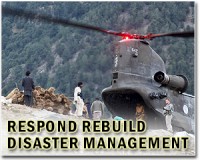| . |  |
. |
Washington (AFP) Feb 7, 2010 Even before cataclysm struck, Haiti was so impoverished and vulnerable that the term "rebuilding" could be considered optimistic. The small Caribbean nation relied on foreign aid to feed its population of nearly 10 million, half of them illiterate and half are under age 18. The near-complete deforestation of its hilly terrain made it especially vulnerable to the hurricanes that regularly sweep the Caribbean basin. The January 12 magnitude 7.0 earthquake not only killed more than 200,000 people and shattered Haiti's inadequate infrastructure, it also laid bare what one expert called the "fiction" of the Haitian government. The state does not provide basic services such as reliable tap water, energy, or security, and Haiti is the only country in the Americas that does not offer free primary education to most of its children. Before the devastating quake soldiers with the UN stabilization force and foreign donors helped run the state, propping up "a carefully maintained fiction that the Haitian government is in charge of affairs," said Daniel Erikson, a Haiti specialist at the Washington-based Inter-American Dialogue. "Now it is impossible to maintain that fiction," Erikson told AFP. Haiti will be "in an extremely precarious state for must of this century, just like it was last century." Given Haiti's pressing needs, which include caring for one million people left homeless by the earthquake, few people are talking at this stage about long-term development plans. Yet amid such dismal evaluations, experts here see specific steps that can be taken to assist Haiti once the emergency phase is over -- and even reasons for hope. Former US envoy to Haiti James Dobbins said the country has intrinsic strengths, including a strong sense of national identity, a vibrant culture, and a lack of ethnic or religions sectarian divides. Haiti is also located "in the midst of a zone of peace and relative prosperity. All of its neighbors are much richer, and none have any interest in destabilizing Haiti or inhibiting its development," Dobbins said in testimony to Congress in late January. Dobbins, now an expert on reconstruction at the Rand Corporation think tank, cautioned that the first essential step was maintaining the peace. "Security is an essential prerequisite to reform, as it is to private investment. In the absence of security, any positive changes will eventually be washed away," he said, calling on the Security Council to keep UN stabilization troops in Haiti for up to 10 years. Foreign experts are helping train Haiti's police, the country's sole security force since the army was disbanded in 1995 for chronic involvement in political unrest. Dobbins said that donors who help rebuild basic Haitian infrastructure like hospitals, roads and government buildings should also "insist on fundamental reforms in the management of these institutions." Haiti's Caribbean neighbors show what it could achieve. Those countries -- including Haiti's partner on the isle of Hispaniola, the Dominican Republic -- have economies largely based on agriculture, manufacturing and tourism. Haiti could too, said Johanna Mendelson Forman, a Haiti expert at Washington's Center for Strategic and International Studies. "This means decentralization away from the capital; construction of new infrastructure, roads, and distributive energy systems to end rural isolation; and a rededication to agriculture so that Haitians can grow their own food," she said in an interview on the CSIS website. Erikson said that Washington could help create favorable trade arrangements to boost Haiti's agricultural exports, such as mangos. But he believed that the Haitian government can't -- and the foreign community would rather not -- take charge of developing long-term plans. The Haitian government is a government in name only, Erikson said, as he described the country's problems as a "hot potato passed between the government and the international community." Money sent home by Haitians living abroad is a major source of income for the impoverished country, and Dobbins urged Washington temporarily to raise the quota of Haitians allowed into the United States. "Every dollar they emit to relatives in Haiti is another dollar that does not need to come from US taxpayers," Dobbins said. Both Mendelson Forman and Erikson also warned against another danger: donor fatigue. "After this natural flare of interest and support, interest fades," Ericson said. Haiti will need "substantial foreign aid for the foreseeable future," he added. In the meantime, the London-based Disasters Emergency Committee (DEC) urged foreign donors to also plan for Haiti's next potential disaster, such as hurricanes. Hurricane season runs from June 1 to November 30 in the Caribbean, and in 2008 four big storms pounded the country killing around 800 people and causing millions of dollars in flood damage. Foreign donors "must not rush into a quick-fix rebuilding of permanent homes, schools and other buildings in Haiti," a DEC statement said.
Share This Article With Planet Earth
Related Links Bringing Order To A World Of Disasters A world of storm and tempest When the Earth Quakes
 Cockfighting survives Haiti's earthquake devastation
Cockfighting survives Haiti's earthquake devastationPort-Au-Prince (AFP) Feb 6, 2010 The cockfighting must go on, even after earthquakes, so the roosters have been bathed, their claws sharpened, and they wait in cages in the red-carpeted ring, the crowd anxious and gripping cash. The referee has weighed them and announced their names - Doudou versus Zo La Plaine - and now he wants a moment of silence for prayer. Everyone stands, heads bowed. After a couple minutes, the ... read more |
|
| The content herein, unless otherwise known to be public domain, are Copyright 1995-2010 - SpaceDaily. AFP and UPI Wire Stories are copyright Agence France-Presse and United Press International. ESA Portal Reports are copyright European Space Agency. All NASA sourced material is public domain. Additional copyrights may apply in whole or part to other bona fide parties. Advertising does not imply endorsement,agreement or approval of any opinions, statements or information provided by SpaceDaily on any Web page published or hosted by SpaceDaily. Privacy Statement |